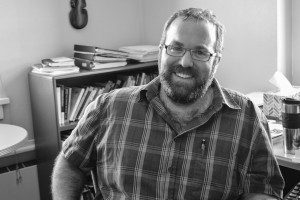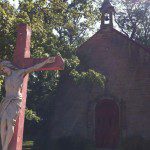A Reading from the Book of the Prophet Isaiah 56:1-3A, 6-8
I’m a misfit, especially as a person of faith. I’m a Pentecostal Episcopalian, who’s never given up being Pentecostal (even though that is really not cool in the academic and literary circles I run in), and I haven’t yet been baptized Episcopalian (to the confusion of my priest and bishop). I also pray the rosary, venerate St. Mary of Egypt (was there ever a saint with a more charismatic conversion?), write Catholic fiction, think like a Catholic, but am not Catholic. (Please don’t share this with any of my evangelical friends, it will only confuse and worry them). And to make matters worse—or at least more ambiguous—I’m a Christian who learns the most profound lessons about my own faith through the lives, stories, and teachings of people who are not Christians: Jewish writers, secular thinkers, indigenous artists, etc. The list is long.
It used to surprise me that non-Christians often better reflected or articulated the Gospel than many of those in my own faith community, including myself. But then I stumbled over the records of Tolkien’s long talk with Lewis about the truth of myths and how God speaks through non-Christian imaginations, through lives foreign to the Christian faith—misfits. That God speaks in such ways, through such people, struck me as true not because it was Tolkien or Lewis thing—I hadn’t been baptized into the evangelical Inkling cult, yet. It struck me as true because I had already, in weird ways, been given back my own beliefs in the lives of others.
Tolkien’s ideas, of course, came to mind when I read the passage from Isaiah for today:
Let not the foreigner say,
when he would join himself to the LORD,
“The LORD will surely exclude me from his people.”
The foreigners who join themselves to the LORD,
ministering to him,
Loving the name of the LORD,
and becoming his servants–
All who keep the sabbath free from profanation
and hold to my covenant,
Them I will bring to my holy mountain
and make joyful in my house of prayer;
Their burnt offerings and sacrifices
will be acceptable on my altar,
For my house shall be called
a house of prayer for all peoples.
I know this passage is most often read as a call to include foreigners in the people of God, but I wonder if it can be heard as a call to the people of God to listen to foreigners, outsiders to their faith communities.
What might we learn if we did that?
Maybe as a Christian I’d better realize that Christ isn’t a passive lump of holiness I possess, a mystic talisman to conserve. Maybe I’d realize Christ always slips the gilded boxes I make to hold God and takes to the back alleys of my life, inviting foreigners, refugees, and other sick pilgrims into the raucous life of heaven. Maybe it’s in their offerings and not mine that Christ chooses to be embodied—made flesh—for my sake, for our sake.
 Samuel Martin is the author of the story collection This Ramshackle Tabernacle (Breakwater 2010), shortlisted for Canada’s BMO Winterset Award, and also the novel A Blessed Snarl (Breakwater 2012), nominated for the International IMPAC Dublin Literary Award. A Canadian, he teaches creative writing at Northwestern College in Iowa, the warmest possible climate in which he can imagine living.
Samuel Martin is the author of the story collection This Ramshackle Tabernacle (Breakwater 2010), shortlisted for Canada’s BMO Winterset Award, and also the novel A Blessed Snarl (Breakwater 2012), nominated for the International IMPAC Dublin Literary Award. A Canadian, he teaches creative writing at Northwestern College in Iowa, the warmest possible climate in which he can imagine living.












